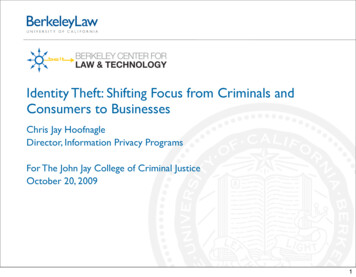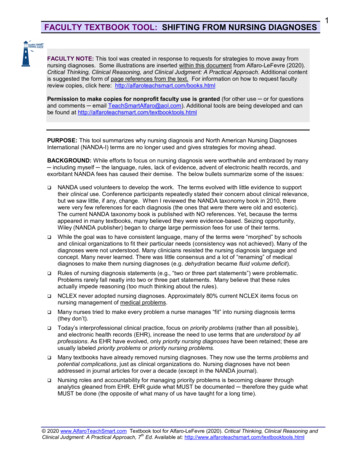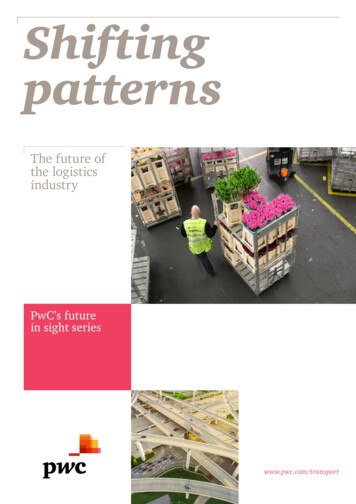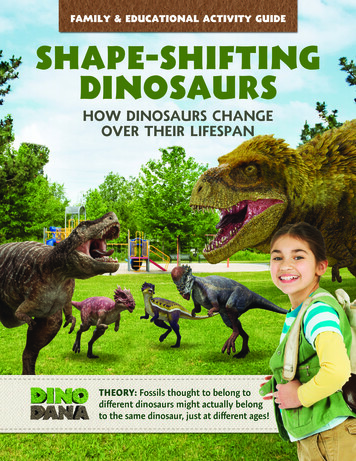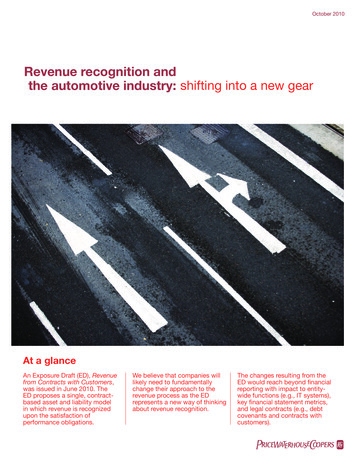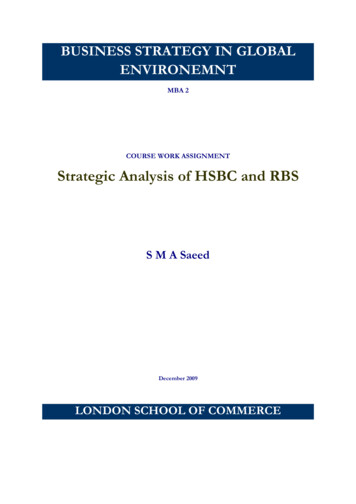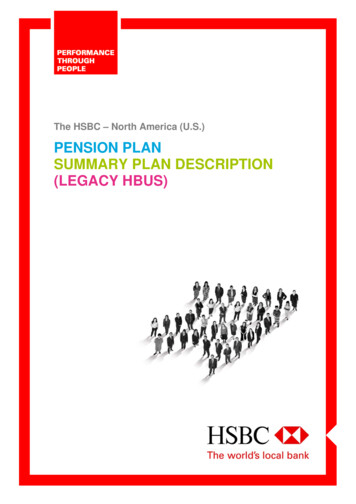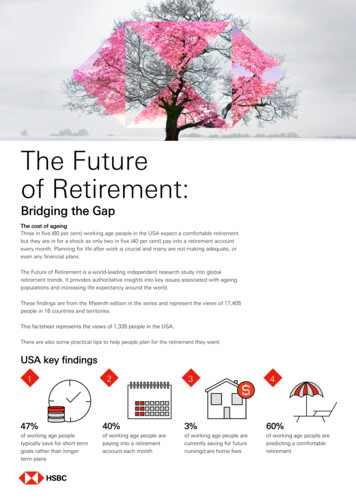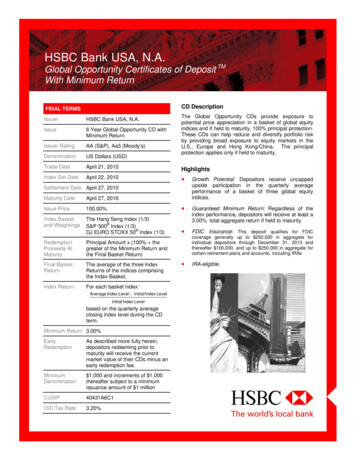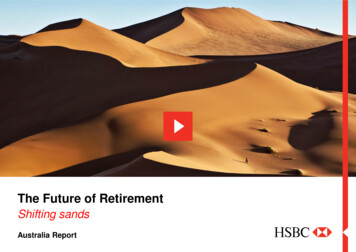
Transcription
The Future of RetirementShifting sandsAustraliaReportThe FutureFutureof Retirementof RetirementShiftingShiftingsandssands
ForewordThe changingretirementlandscapePractical stepsThe Future of Retirement Shifting sandsKey findingsPlanning forretirement ina volatile ageMillennials andretirementRetirement 2.0The research2
ForewordWe live in interesting times. Unprecedented political, social,economic and technological change means it has never beenmore challenging or more important to save for a goodretirement.Our latest report in The Future of Retirement series, Shiftingsands, looks at how important issues like the ageingpopulation, rising healthcare costs and long term low interestrates are affecting the retirement plans of people around theworld.The report investigates how people are making sacrifices,exploring new sources of funding and adjusting their retirementexpectations for a world that is very different even to that of tenyears ago.I hope that the new insights and practical steps in this reportwill help you to plan for the best possible retirement.Charlie NunnGroup Head of Wealth Management, HSBCThe Future of Retirement Shifting sands3
Key findings44%73%75%of working age people think lowinterest rates mean they will need towork for longerof working age people believe levelsof national debt mean there will beless support for the elderlyof working age people believeretirees will have to spend more onhealthcare costs in the future21%51%46%of working age people think they willbe financially comfortable inretirement, based on how theirretirement saving is progressingof working age people say they willcontinue working to some extent inretirementof working age people thinkproperty offers the best returns forretirement savingRead moreThe Future of Retirement Shifting sands4
Key findings11%2563of people think Millennials are in thebest position for a comfortableretirement, compared to 42% whothink Baby Boomers areis the average age Millennialsstarted saving for retirementis the average age Millennialsexpect to retire44%35%41%of people believe that Millennials areof working age people believe newpaying for the economic consequences technology makes saving forof previous generationsretirement easierThe Future of Retirement Shifting sandsof working age people believe newtechnology will help give futureretirees a better standard of living5
The changingretirementlandscapeFutureTheFutureof Retirementof RetirementShiftingShiftingsandssands6
A new worldThe world is changing and retirement is changing with it.Major political, social, economic and technological changesare having a significant impact on how people view theirretirement prospects.Ageing populations and rising national debts are sappingconfidence in the ability of economies around the world tocontinue supporting older people. Overall, 62% of workingage people in Australia are concerned about declining statepensions/social provision and 62% about the growingnumber of older people requiring retirement funding/support.Nearly three-quarters (73%) of working age people agreethat levels of national debt mean there will be less supportfor the elderly.Just under a third (31%) of working age people believe statepensions will no longer exist when they come to retire, andthis view is more common among Millennials (35%) thanBaby Boomers (17%).Working age people concerned about declining statepensions/social provision62%58%65%63%AverageMillennialsGeneration XBaby BoomersQ. To what extent, if at all, are you concerned about the following affecting your retirement?A. Declining state pensions/social provision (Base: Working age people)Working age people who believe state pensions will nolonger exist when they retire31%Average35%39%MillennialsGeneration X17%Baby BoomersQ. Do you think state pensions will still exist when you come to retire?A. No (Base: Working age people)The Future of Retirement Shifting sands7
Volatile economiesSixty-one percent of working age people are concernedabout the impact of economic uncertainty on their ability tosave for retirement. Fifty-two percent say it will be moredifficult to save for a comfortable retirement following thefinancial crisis of 2007/8.‘Lower for longer’ interest rates are also making it harder tosave for a comfortable retirement. More than two fifths(44%) of working age people think low interest rates willmean they will need to work for longer (compared to theglobal average of 50%), while 36% say they need interestrates to rise if they are to save enough to be comfortable inretirement.44%of working age peoplethink low interest ratesmean they will need towork for longerThe Future of Retirement Shifting sands8
15278A19231AHealth chequeThe rising cost of healthcare is another important issue.Seventy-five percent of working age people believe thatretirees will have to spend more on healthcare costs in thefuture, and 66% are concerned about being able to fundtheir health care.Thirty percent of working age people worry about theavailability and affordability of healthcare compared to globalaverage of 25%*.25178A33%of working agepeople worryabout theavailability andaffordability ofhealthcareThe Future of Retirement Shifting sands*Excludes China and Taiwan19123A9
Planning forretirement ina volatile ageFutureTheFutureof Retirementof RetirementShiftingShiftingsandssands10
Expecting the worstThe changes in the retirement landscape are forcing peopleto adjust their expectations for retirement. Based on howtheir retirement saving is progressing, only 21% of workingage people think they will be financially comfortable whenretired.Meanwhile, constant change is making it difficult to planahead, with 43% of working age people believing thingschange so much that their retirement plan won't beapplicable by the time they retire. Nearly one third (32%)have not started saving for retirement.In light of this, 51% of working age people say they willcontinue working to some extent in retirement. Sixty-eightpercent would be willing to defer their retirement for twoyears or more to have a better retirement income. Thirtyfour percent would work for longer or get a second job tosustain their saving for retirement.51%of working agepeople say they willcontinue working tosome extent inretirementThe Future of Retirement Shifting sands11
Length of retirementOn average, working age people expect to retire at age 64(compared to the global average of 61) and expect to live toage 85 (global average of 81), resulting in a retirement of 21years (global average of 20).There is little variation between generations’ expectations ofwhen they will retire and how long they will live. Millennialsexpect to retire at age 63, Generation X at 64 and BabyBoomers at 65. Millennials expect to live to age 85,Generation X to 83 and Baby Boomers to 87, resulting inexpected retirements of 22, 19 and 22 years respectively.The Future of Retirement Shifting sands64is the averageage working agepeople expect toretire12
Funding retirementProperty is viewed as offering the best returns forretirement savingPropertyIn a time of continuing economic volatility, property is viewedas a good way of saving for retirement, with 46% of workingage people thinking it delivers the best returns. Thiscompares to 26% for stocks and shares, 23% for cashsavings, 7% for government/corporate bonds and 5% forbuying business.This is not yet fully reflected in retirement plans, with only20% of working age people expecting property to help fundtheir retirement. Thirty-six percent expect state pension/social security to be a source of funding, cash savings 34%,and their own income 24%.46%Stocks and shares26%Cash savings23%Government/corporate bonds7%Buying a business5%Foreign currency3%The Future of Retirement Shifting sandsQ. Which of the following do you think offers the best returns for retirement saving?(Base: Working age people)13
Risk appetiteWith interest rates at historic lows, 37% of working agepeople think they will need to move their money fromsavings into investments and 32% actively move theirmoney around to get the best return/deal.Nonetheless, there is a relatively low appetite for risk, withonly 21% of working age people being very willing to makerisky investments to ensure their financial stability and 21%being willing to risk financial losses.32%of working agepeople activelymove their moneyaround to get thebest return/dealForty-three percent of working age people say theyactively seek information to guide their financial decisions.The Future of Retirement Shifting sands14
Millennials &retirementFutureTheFutureof Retirementof RetirementShiftingShiftingsandssands15
A perfect stormThe economic challenges facing the Millennial generation(those born between 1980 and 1997) are starkly reflected intheir retirement prospects.Forty-five percent of people believe that Millennials haveexperienced weaker economic growth than previousgenerations, while 44% agree that Millennials are paying forthe economic consequences of older generations, such asthe global financial crisis and rising national debt.45%However, 55% of people say that Millennials don’t know howgood they have it, enjoying a better quality of life than anygeneration before them.of people think Millennials haveexperienced weaker economicgrowth than previous generationsThe Future of Retirement Shifting sands16
Retirement prospectsExpected length of retirementAverageWhen it comes to retirement, Millennials are seen as lessfortunate than previous generations. Only 11% of peoplethink Millennials are in the best position for a comfortableretirement, compared to 42% who think Baby Boomers are.Forty-eight percent of Baby Boomers believe that theirown generation is in the best position to retire comfortably.In terms of life expectancy and retirement planning, 64% ofpeople – and 54% of Millennials themselves – believe theMillennial generation will live much longer and will need tosupport themselves for longer.6485Millennials6385Generation X6483Baby Boomers6587Age expect to retireAge expect to live toQ. What age do you expect to retire? Q. What age do you expect to live to?(Base: Working age people)The Future of Retirement Shifting sands17
Taking actionOn average, Millennials started saving for retirement at age25. However, 39% of Millennials have not yet started savingfor retirement, compared to 29% of Generation X and 25%of Baby Boomers.69%of Millennials are preparedto cut back on theirexpenses in orderto saveWith 66% of Millennials concerned about running out ofmoney affecting their retirement, 69% are prepared to cutback on their present expenses in order to save, comparedto 66% of Generation X and 62% of Baby Boomers. Sixtyfive percent of Millennials see saving as a difficult butnecessary task (Generation X 68%, Baby Boomers 63%).There is difference across generations in terms of financialrisk aversion. Twenty-eight percent of Millennials are verywilling to make risky investments to ensure their financialstability which is a higher proportion than Generation X(17%) and Baby Boomers (13%).However, 50% of Millennials actively seek information toguide their financial decisions compared to 39% ofGeneration X and 38% of Baby Boomers.The Future of Retirement Shifting sands18
Defining the generationsBaby BoomersGeneration XMillennialsBorn 1945 to 1965Born 1966 to 1979Born 1980 to 1997WAR D.ENDE1960sUS Civil Rightsmovement1945End of WWII1989Fall of Berlin Wall1960sKIN GMA RTIN LUT HER1953Discoveryof DNA1957European CommonMarket establishedThe Future of Retirement Shifting sands1969Woodstockfestival1969Moon landing1991Launch ofInternet1997First HarryPotter book19
Retirement 2.0FutureTheFutureof Retirementof RetirementShiftingShiftingsandssands20
Saving time and moneyHow new technologies help people plan for retirementPut money into an online saving account25%19%Technology is changing the way people save for retirement.Over a third (35%) of working age people agree that newtechnology makes it easier to save for their retirement.Researched options on the internet16%People are using new technology in different ways to planfor and manage their retirement.21%Used an online retirement calculator15%4%Used a retirement planning app8%3%Spoke to an adviser online e.g. live chat5%3%0%Received robotic financial advice4%Working age peopleThe Future of Retirement Shifting sandsRetireesQ. What role, if any, has new technology played in helping you plan for yourretirement? (Base: All)21
Stay connectedThe role of technology in retirementHelps me stay connected with family and friends77%Additionally, over a third (41%) of working age peoplebelieve that new technology will help give future retirees abetter standard of living.People are using or think they will use new technologies indifferent ways in retirement.89%Helps me to continue working64%22%Helps me stay active and mobile51%59%Monitors and maintains my health53%40%Working age peopleRetireesQ. Do you think you will use/are you using any of the following new technologies inyour retirement? (Base: All)The Future of Retirement Shifting sands22
Practical stepsHere are some important insights and practical actions drawn from the research findings, which mayhelp today’s retirement savers plan a better financial future for themselves.Be realisticabout yourretirementThe Future of Retirement Shifting sandsConsiderdifferentsourcesof fundingPlan for theunexpectedTakeadvantage oftechnology23
Practical stepsHere are some important insights and practical actions drawn from the research findings, which mayhelp today’s retirement savers plan a better financial future for themselves.64%of people think Millennialswill live much longer and willneed to support themselvesfor longer. 75% of workingage people believe retireeswill have to spend more onhealthcare costs in thefuture.Considerdifferentsourcesof fundingPlan for theunexpectedTakeadvantage oftechnologyMake sure you are wellprepared for a long andcomfortable retirement bystarting to save earlier andmore. Factor potentialhealthcare costs into yourretirement planning.The Future of Retirement Shifting sands24
Practical stepsHere are some important insights and practical actions drawn from the research findings, which mayhelp today’s retirement savers plan a better financial future for themselves.Be realisticabout yourretirement37%of working age people thinklow interest rates mean theywill need to move theirmoney from savings intoinvestments. 47% thinkproperty offers the bestreturns for retirement saving.Plan for theunexpectedTakeadvantage oftechnologyBalance your ways of savingand investing for retirementto spread the risk andmaximise the returns. Berealistic about your expectedreturns.The Future of Retirement Shifting sands25
Practical stepsHere are some important insights and practical actions drawn from the research findings, which mayhelp today’s retirement savers plan a better financial future for themselves.Be realisticabout yourretirementConsiderdifferentsourcesof funding28%of working age people wouldgo back to work if theirretirement income could nolonger provide the standardof living they were used to.Takeadvantage oftechnologyUnexpected events canhave a major impact onretirement funding. Includeworst case scenarios whenplanning your retirement andconsider putting protection inplace to help secure yourretirement income.The Future of Retirement Shifting sands26
Practical stepsHere are some important insights and practical actions drawn from the research findings, which mayhelp today’s retirement savers plan a better financial future for themselves.Be realisticabout yourretirementConsiderdifferentsourcesof fundingPlan for theunexpected13%of people have used anonline retirement calculatorand 7% a retirementplanning app.Embrace new technology tomake planning for yourretirement easier. Onlineplanning tools can help youunderstand your retirementfunding needs and trackprogress towards your goals.Seek professional financialadvice if you need help.The Future of Retirement Shifting sands27
The researchThe Future of Retirement is a worldleading independent research studyinto global retirement trends,commissioned by HSBC. It providesauthoritative insights into the keyissues associated with ageingpopulations and increasing lifeexpectancy around the world.This report, Shifting sands, is thefourteenth in the series andrepresents the views of 18,414people in 16 countries andterritories.Since The Future of Retirementprogramme began in 2005, morethan 177,000 people have beensurveyed worldwide.SurveyThe Future of Retirement Shifting sandsAbout HSBCLegalCopyright28
The researchThe Future of Retirement is a worldleading independent research studyinto global retirement trends,commissioned by HSBC. It providesauthoritative insights into the keyissues associated with ageingpopulations and increasing lifeexpectancy around the world.This report, Shifting sands, is thefourteenth in the series andrepresents the views of 18,414people in 16 countries andterritories.The findings are based ona representative sample ofpeople of working age(21 ) and in retirement, ineach country or territory.The research wasconducted online by IpsosMORI between November2016 and January 2017,with additional face-to-faceinterviews in Egypt and theUAE.Since The Future of Retirementprogramme began in 2005, morethan 177,000 people have beensurveyed worldwide.The 16 countries andterritories are: ArgentinaAustraliaCanadaChinaEgyptFranceHong ted Arab EmiratesUnited KingdomUnited StatesThis country reportrepresents the views of1,000 people in Australia.Retirees are people whoare semi or fully retired.Working age people arethose who have yet to semior fully retire.Figures have been roundedto the nearest wholenumber.SurveyThe Future of Retirement Shifting sands29
The researchThe Future of Retirement is a worldleading independent research studyinto global retirement trends,commissioned by HSBC. It providesauthoritative insights into the keyissues associated with ageingpopulations and increasing lifeexpectancy around the world.This report, Shifting sands, is thefourteenth in the series andrepresents the views of 18,414people in 16 countries andterritories.Since The Future of Retirementprogramme began in 2005, morethan 177,000 people have beensurveyed worldwide.HSBC Holdings plc, the parentcompany of the HSBC Group, isheadquartered in London. TheGroup serves customersworldwide from around 4,000offices in 70 countries andterritories in Europe, Asia, Northand Latin America, and theMiddle East and North Africa.With assets of US 2,375bn at 31December 2016, HSBC is one ofthe world's largest banking andfinancial services organisations.About HSBCThe Future of Retirement Shifting sands30
The researchThe Future of Retirement is a worldleading independent research studyinto global retirement trends,commissioned by HSBC. It providesauthoritative insights into the keyissues associated with ageingpopulations and increasing lifeexpectancy around the world.This report, Shifting sands, is thefourteenth in the series andrepresents the views of 18,414people in 16 countries andterritories.Since The Future of Retirementprogramme began in 2005, morethan 177,000 people have beensurveyed worldwide.Information and/or opinionsprovided within this reportconstitute research informationonly and do not constitute anoffer to sell, or solicitation of anoffer to buy any financialservices and/or products, orany advice or recommendationwith respect to such financialservices and/or products.LegalThe Future of Retirement Shifting sands31
The researchThe Future of Retirement is a worldleading independent research studyinto global retirement trends,commissioned by HSBC. It providesauthoritative insights into the keyissues associated with ageingpopulations and increasing lifeex
retirement. Our latest report in The Future of Retirement series, Shifting sands, looks at how important issues like the ageing population, rising healthcare costs and long term low interest rates are affecting the retirement plans of people around the world.
